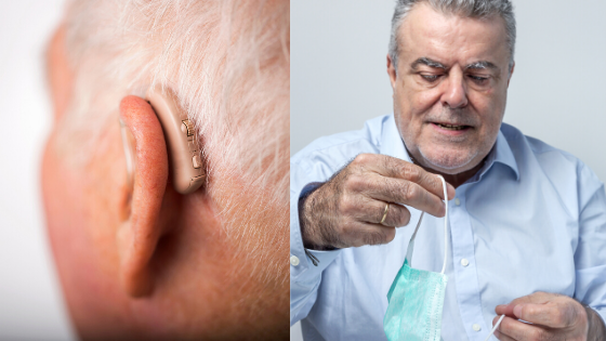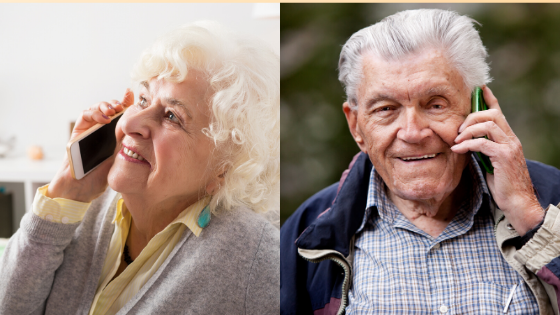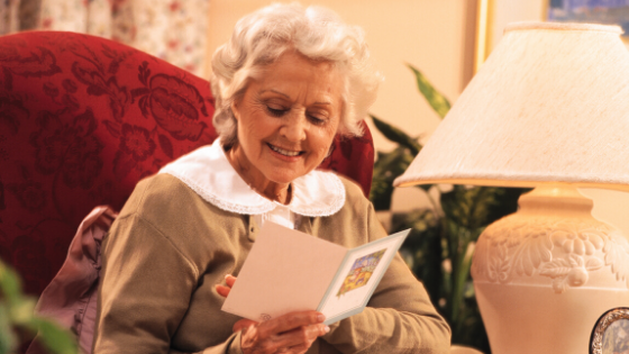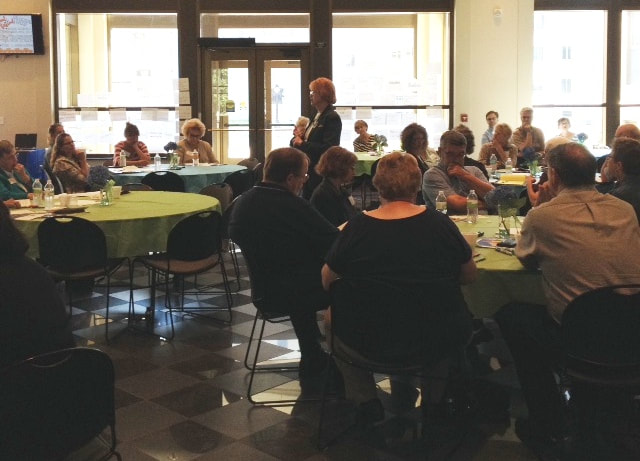|
Covid-19 has required us to protect ourselves by wearing masks. Sadly, masks interfere with hearing aids. Thus, those who want to hear must contend with protection that makes hearing aids come loose, fall out of the ear, or tangled with the hearing device. That frustration could lead to quitting the mask or quitting the hearing aids.
We need both. Numerous research articles have documented the connection between maintaining one’s hearing and keeping one’s memory. Hearing aids are for more than hearing. On the other hand, the CDC guidelines are quite strict about wearing a mask to protect ourselves from Covid-19. We will need masks until we can develop an effective treatment and or a vaccine. That could be years. In Help! My Face Mask Is Getting in the Way of My Hearing Aid, AARP offers some ideas. While these might do for now, we should consider developing an easy-to-use, simple, device that does the job. If we can develop safety pins and zipper; we make a better device.
0 Comments
Has this happened to you? “I took groceries to my Mom. She wanted have coffee with me. I’ve tried to tell her I couldn’t, but she just doesn’t get it! I don’t know what to do”!
Caregiving is a demanding process and Covid-19 adds more demands. Caregivers still try to respond to their loved ones even under new circumstances. In the past, the caregiver could might take the elder shopping; not now. Shopping was an outing, a chance to socialize, and a chance for the caregiver to assess how the elder was doing. Now, we wear masks and are encouraged to shop as quickly: a-l-o-n-e. We only have a fleeting glance at our loved one on food drop-off. We can’t just pop in the house or care facility to check on things for ourselves. We must rely on reports from our loved one, the staff or (sometimes) the news. Imagine reading the news and learning your parent’s facility has a Covid-19 outbreak! Caregivers revealed they felt guilty before, it’s especially true now. Some guilt seems to be rooted in the feeling, “I can’t do anything!” Yes, you can. Caregivers used to worry about elders taking medicine properly or eating regularly; now worries include possible exposure, illness & death. To add to these concerns, seniors seem to want more from the caregivers. They ask caregivers to run more errands or ask for things not appropriate to their diet or welfare. An elder asked me to try to take money out of an ATM with his bank card! Why are elders making more or different or even illegal requests? There are a couple reasons. First, caregivers make the distinction between the Covid-19 as the cause and the changes in our lives as the response. Sometimes, that distinction is not as clear to the elder. “They just don’t get it”; is a sign to caregivers that the senior hasn’t understood in the first place. Everybody has studied something that felt very different when actually experiencing it. Think of your first time behind the wheel of a car. No instruction manual prepared you for that feeling of your foot on the accelerator. Childbirth classes help, but they can’t communicate what it feels like to give birth to a child. After the experience, we “got it”. Making it real,related to the senior’s early experiences, helps them to “get it”. Second, caregivers understand the impact of this pandemic process. So, instead of doing more errands, we need to take the time to help seniors grasp the process. We feel guilty because we can’t take them out, or can’t give them a hug. So, when they ask for more and more, we do it because it makes us feel better. Have you noticed that more errands just aren’t enough? That’s because errands don’t fill the senior’s real need: finding meaning and support. A conversation, in which you focus on their early experiences, such as quarantine, helps them feel the reality of current circumstances. Explanations don’t work as well as a trip down memory lane. Just making the effort to help them understand the experience will fill their need for direction and support from you. Your senior relies on you in ways they can’t express. When they feel like the world has gone crazy, they look to you. When you show effort to help them understand (not expertise) they become calmer and you’ll feel better too. Third, just saying NO, puts limits into their lives and is another way to calm your senior. When times are uncertain, a clear guide creates a sense of stability. They sense that you are looking out for them and you are their leader through these times. Your firm guidance gives them clarity. Then, you have more time and the emotional space to feel less guilty. Caregivers need not do e-v-e-r-y-t-h-i-n-g; just the right things. Fourth, a rule of thumb for elders with dementia is; the more dementia, the longer “emotional antennae”. Your seniors are highly attuned to your moods. They just can’t process the information the way they used to. Covid has shifted everyone’s life. Elders sense that you are struggling to adjust your lifestyle. Caregivers may not want to show these struggles. They feel guilty these the elders depend on their care. The elders already know. When you put words on your feelings, it’s like putting on an oven mitt; now you can handle hot stuff. Your words become the elder’s way to express their own feelings. Keep it simple but keep sharing. Remind them of any major adjustments they had to make in the past: WWII rationing, Great Depression job losses. Emphasize how they made it through hard times and the example they were to you. Thus, the caregiver becomes the mirror that reflects the senior back to their best self. Finally, remind the elder this is only for now, it will not last forever. As the old song says: “Some day; s-o-m-e-d-a-y, we’ll be together (yes we will)! A daughter commented that she had not been able to visit her parent because the facility was “locked down” to prevent the viral spread from Covid. She could only drop his snacks off at the door. She worried. No matter how many times she explained, she still couldn’t get him to understand. Many elders and their adult children face this dilemma. All facilities are closed to visitation: even when the elder is dying! The more frail the elder, the less likely they can manage total separation. Seniors need tangible connections; touch, sight and hearing. How do we keep in touch in an era of no-touch? Families often bring presents to these visits, yet; it’s the present of their presence that elders crave. So, how do we convey presence when we can’t be present? KEEP IT TANGIBLE: E-cards are nice but a classic greeting card is tangible.Your loved one can hold it or look at it repeatedly. Tuck a greeting card into a bag of groceries or a bunch of flowers. The facility staff can point to it to remind them that you are keeping in touch. MAIL CARDS: It helps support our postal service and your loved one. Getting mail is a big event in care facilities. It’s not how fancy the card, it’s how often you provide a reminder that you care. TRY PRINTED PHOTOS: These are more tangible. Perhaps you got your loved one a cell phone and sent them pictures. That wasn’t their early experience. For decades, today’s elders only had the paper option. When you send a shiny paper photo it resonates. Photos used to require going to a studio, posing, and were made for special occasions. Photos were important. So printed photos carry an important message from you; “You are important to me”. Children’s crayon drawings carry the unique, tangible message. They are especially important if the drawings are labeled with the child’s name, date, and something about the picture. That way, the staff can point out the picture later, when the elder says they think they’re forgotten. WHAT’S THEIR FRAME OF MIND: We’ve all had a crash course about pandemics. Elders may not have paid as much attention to the news. Some have turned news off altogether. 98+% of today’s elders weren’t alive during that last pandemic in 1918. It isn’t part of their experience. They can’t relate to the scale of lock down necessary to contain a pan-demic. Some may have known families who were quarantined when they were children; but they are not familiar with a whole society in quarantine. So what do you tell them about why you can’t be there? Start by asking them what they know about today’s news. If they have been following the news, use their level of information to determine what you share about your being away. If they don’t seem to know; try a simpler explanation: you “have to be away for awhile”. You’ve taken vacations, trips and returned. This is just another time away. Promise only that you will return. Say that in a card as well as on the phone. Say it often. “ Someday, some way, we’ll be together”. That’s what the song says and that’s my prayer for all of us. Corona Virus-19 is not your parents' quarantine. Before vaccines, quarantines were a common event. Your senior may have lived through several of them. with the passage of time, the anxiety and social disruption may have been lost. All that remains in their minds is that they survived. I've met some seniors who think this is just another flu. They believe that, because they've lived this long, they're immune. It's been a challenge to convince them that this virus has an impact closer to that of the 1918 Spanish flu. I usually ask them if their parents ever discussed the Spanish Flu. Then I draw the comparison.
I've also had to explain that our immune systems change with age. We all know hair turns white/gray with age but not all changes are equally visible. The senior may not realize that they may succumb to this disease because their immune systems are affected with age. I share these points to forewarn caregivers that your senior my see this disease very differently than you do. What's in your senior's mind? If the senior doesn't get the message, they will be more likely to get the disease. Stay well and set a good example; wash your hands with your senior. Thanx, Sara |
Author "A Senior Moment" is written by Ms. Sara Lieber, owner of Senior Sidekicks. Ms. Lieber has over 30 years of experience in senior care. Archives
March 2024
Categories
All
|





 RSS Feed
RSS Feed